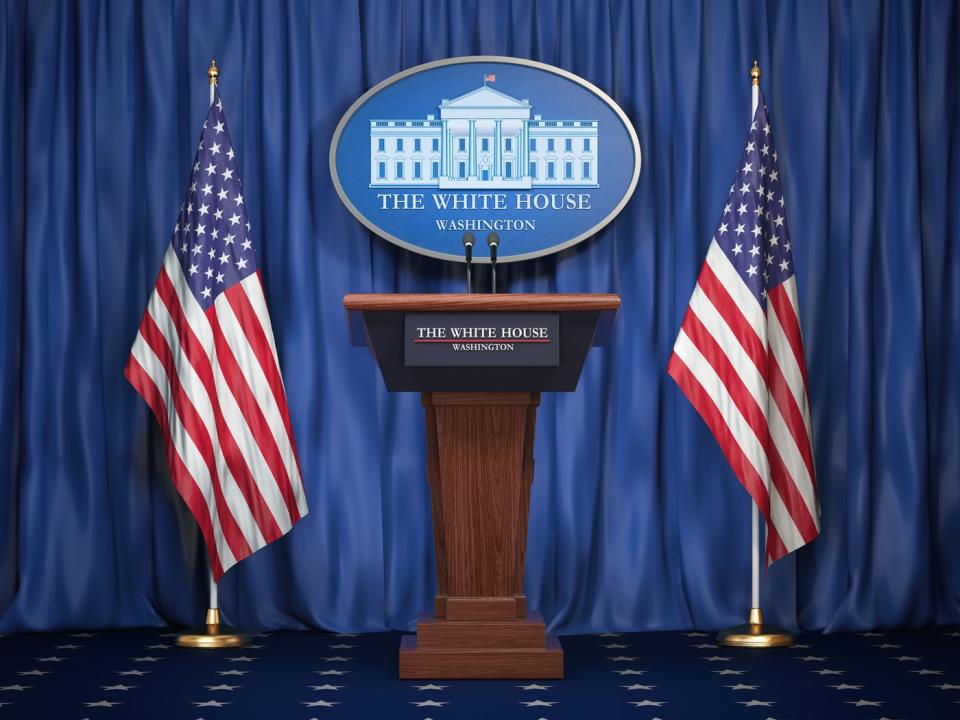Would Kamala Harris or Donald Trump Be Better for the Stock Market? It's Complicated.
Elections matter for investors, and presidential elections matter a lot. Their outcomes determine the agenda in Washington, D.C. for the subsequent four years.
As usual, the Democratic and Republican nominees for U.S. President have very different agendas they'd like to pursue. Would Kamala Harris or Donald Trump be better for the stock market? It's complicated.

The carryover effect
One big reason it's hard to determine how the stock market will perform under a new president is that things that happened during the previous president's term can carry over into the new administration. History is chock-full of examples of this carryover effect.
The S&P 500 sank as much as 25% during the first 19 months of Ronald Reagan's first term. This decline and accompanying recession, though, were due primarily to the Federal Reserve raising interest rates in an attempt to bring down soaring inflation that began before Reagan took office.
Similarly, the S&P 500 fell 16% in 2001 -- the first year of George W. Bush's first term. The sell-off was due to a continuation of the dot-com bubble burst that began in 2000 during the last full year of Bill Clinton's second presidential term.
Note that the carryover effect isn't necessarily related to actions taken by the previous president. For example, former President Clinton didn't cause tech-stock valuations to rise to unsustainable levels. This underscores another important point: Factors can occur that affect the stock market that are outside the control of any president.
The policy puzzle
The policies of a new U.S. President can impact how stocks perform. However, sometimes, different policies can offset each other to an extent.
For example, GOP presidential nominee Trump has proposed lowering corporate tax rates, a move that could boost companies' profits and lead to higher stock prices. On the other hand, Trump also wants to impose stiff tariffs on all imports and even higher tariffs on Chinese imports. Many economists think the tariffs could cause inflation to spike, which could prompt the Federal Reserve to increase interest rates and cause stocks to fall.
Democratic presidential nominee Harris has said she wants to "take on big corporations that engage in illegal price gouging." This could help lower inflation and boost stocks. However, Harris has also committed to raising the federal minimum wage. Some economists (although not all of them) believe minimum-wage increases lead to higher inflation, which could hurt stocks.
Party time
Republicans want to be known as the pro-business party, while Democrats are more likely to fight against what they view as corrupt practices by some large corporations. Does that mean the stock market is more likely to soar under a GOP president than a Democratic president? Not necessarily.
Since 1957, the S&P 500 delivered a median annual return of 9.9% (excluding dividends) during years when Republicans were president. However, the S&P's median annual return during Democratic presidential terms was 12.9%.
Which party or parties control Congress also matters. A divided Congress has been best for the S&P 500, regardless of which party's candidate occupied the Oval Office. Between 1950 and 2023, the S&P delivered an average annual gain of 15.72% with a Democratic president and a divided Congress. The index's average annual return during the same period with a Republican president and a divided Congress was 12.2%.
The best answer
So would Harris or Trump be better for the stock market? The best answer is... no one knows. However, there is a definitive best answer for what investors should do whether Harris or Trump wins in November: Don't just focus on a four-year or eight-year period -- think long term.
Over the long run, the stock market has gone up 100% of the time. Presidential administrations come and go, but American businesses continue to work year in and year out to generate profits for their shareholders. While elections matter for investors, time in the market matters a lot more.
Don’t miss this second chance at a potentially lucrative opportunity
Ever feel like you missed the boat in buying the most successful stocks? Then you’ll want to hear this.
On rare occasions, our expert team of analysts issues a “Double Down” stock recommendation for companies that they think are about to pop. If you’re worried you’ve already missed your chance to invest, now is the best time to buy before it’s too late. And the numbers speak for themselves:
Amazon: if you invested $1,000 when we doubled down in 2010, you’d have $20,001!*
Apple: if you invested $1,000 when we doubled down in 2008, you’d have $42,511!*
Netflix: if you invested $1,000 when we doubled down in 2004, you’d have $357,669!*
Right now, we’re issuing “Double Down” alerts for three incredible companies, and there may not be another chance like this anytime soon.
*Stock Advisor returns as of August 12, 2024
The Motley Fool has a disclosure policy.
Would Kamala Harris or Donald Trump Be Better for the Stock Market? It's Complicated. was originally published by The Motley Fool
